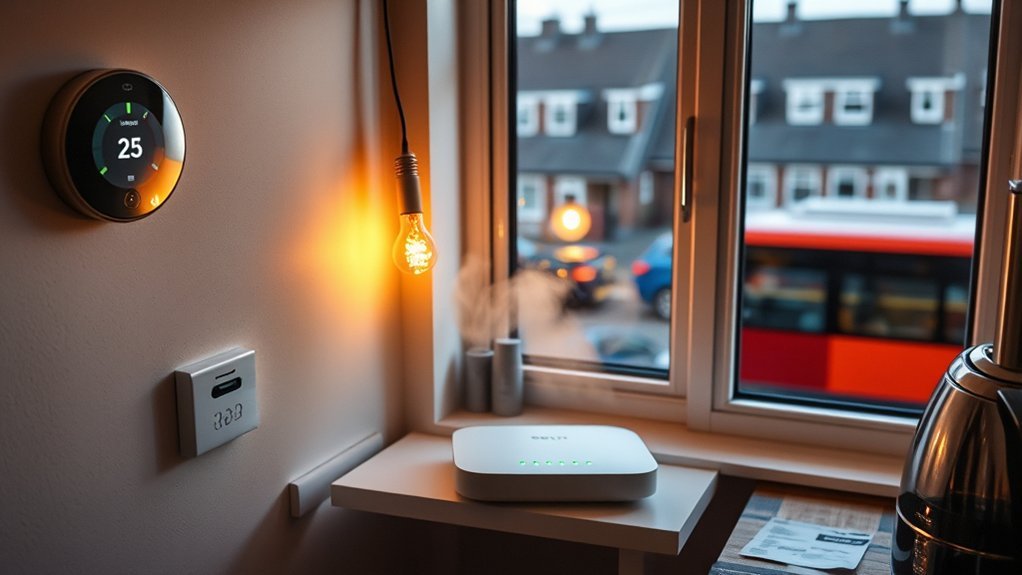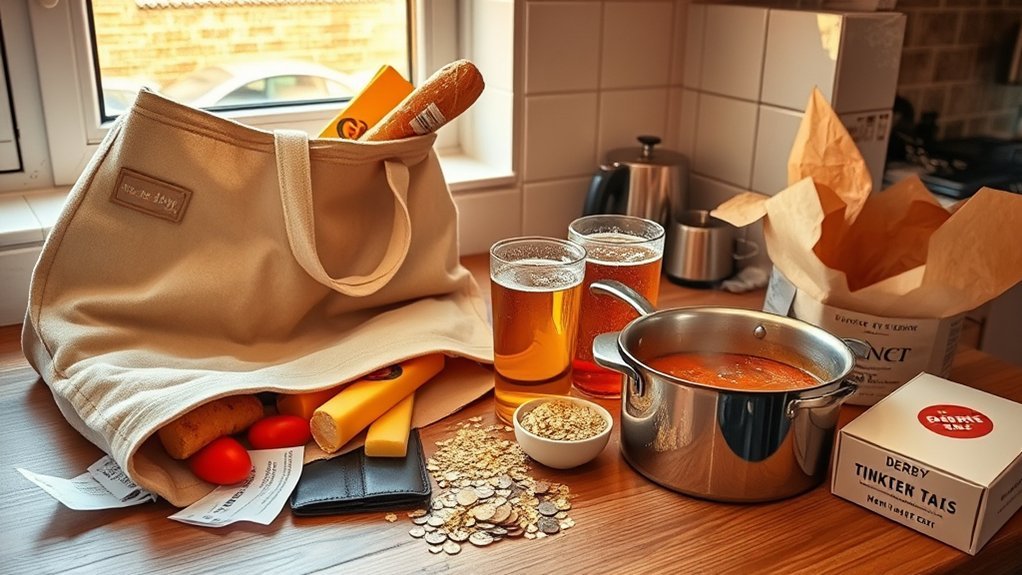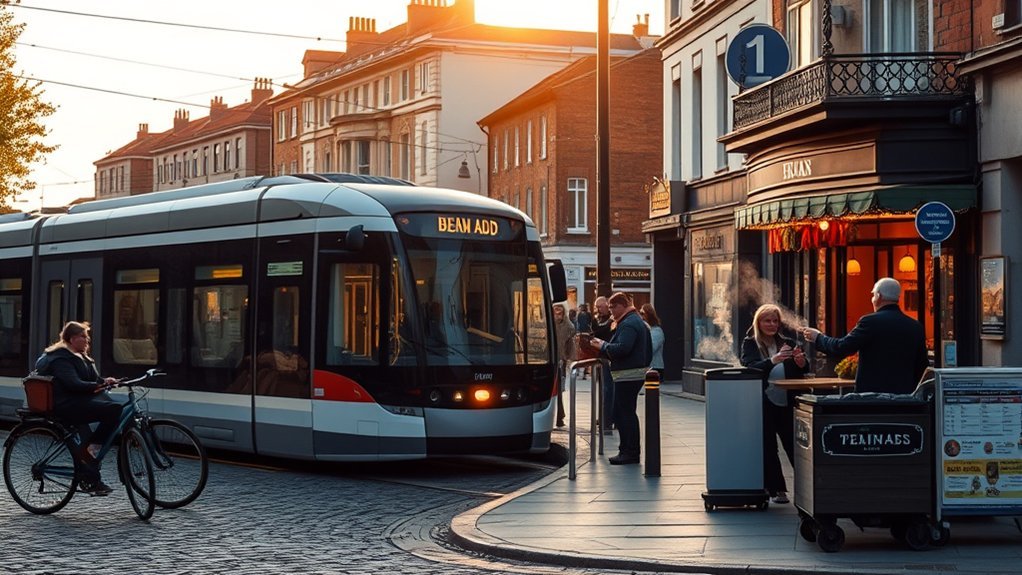You’ll typically need about £800–£1,200 a month in Derby to cover rent, bills, groceries and transport. Rent is the biggest cost: expect £400–£900 for private flats or about £80–£150 per week for halls. Budget £150–£250 for food, £30–£80 for utilities if not included, and around £40–£50 for a transport pass. Factor the NHS surcharge if you’re international. Keep going to see detailed breakdowns and money‑saving tips.
Overview of Monthly Living Costs in Derby

Wondering how much you’ll need to budget in Derby? You’ll find typical living costs for students range between £800–£1,000 monthly, though average estimates can reach £1,038–£1,282 depending on lifestyle. Rent is the biggest outlay, commonly £300–£550 for shared housing; halls or PBSA often cost £450–£700, so factor that into your totals. Groceries usually come to about £150–£250 per month — using store brands and student discounts will cut that. Transportation tends to be affordable: a bus pass runs roughly £40–£50 monthly, while walking or cycling can reduce costs further. Utilities, if not included in rent, typically add £30–£80, and they vary more in shared housing.
When you tally monthly expenses, pick a conservative figure that covers rent, utilities, groceries, transportation and a small buffer for occasional essentials or unexpected costs so your budget stays realistic and flexible.
Housing and Rent Breakdown

Now that you’ve got a handle on typical monthly expenses, let’s look at housing—your biggest single cost. In Derby housing, choices and location drive rent. City centre flats (1‑bed) typically cost £500–£850 per month; suburban 1‑beds run £400–£500. If you need more space, 2–3 bedroom city centre flats sit around £800–£1,200, while outside centre they’re usually £600–£900.
If you’re a student, halls of residence often work out cheaper and simpler: expect £80–£150 per week for a furnished room with shared facilities, frequently with all-inclusive bills included. Private student housing averages about £80–£120 per week per person, varying with amenities and proximity to campus.
Plan by prioritising location versus price and whether you want bills included. Compare total monthly cost, transport time and lease flexibility before committing, so your housing choice fits both your budget and lifestyle.
Utilities, Bills and Internet

How much will utilities add to your monthly bills? Expect utilities in Derby to range roughly £120–£160 for a standard flat, though smaller shares or non-inclusive setups can fall between £30–£80. These bills usually cover electricity, heating, water and waste disposal; shared houses can push costs up or down depending on consumption.
If you live in university halls or PBSA, utilities are often included, lowering separate monthly expenses but reducing flexibility over suppliers and usage. Internet is sometimes bundled with utilities; if not, budget an extra modest monthly fee for a broadband plan. When planning your rent and monthly expenses, treat utilities as a variable cost—seasonal heating and occupant behavior will affect totals.
To keep bills manageable, compare providers, check insulation and meter types, and split costs transparently in shared homes. Accurate budgeting for utilities, bills and internet will give you a clearer picture of affordability in Derby.
Food, Groceries and Dining Out

Next you’ll look at food costs and how to keep them under control on a Derby budget. Plan groceries at about £150–£250 a month, favouring store brands and big retailers, and consider quick cheap meals like £8 fast-food options or £10–£25 casual dining when eating out. I’ll also cover tips for stretching your shop, typical restaurant prices (£40–£60 for a three-course meal for two), and smart cheap-meal choices.
Grocery Budgeting Tips
Looking to stretch your food budget in Derby? Focus on grocery budgeting by planning meals around supermarket offers at Tesco, Asda and Sainsbury’s and choosing store brands for mid-range groceries.
Aim for £150–£250 monthly food costs if you’re a student, with £200 a useful benchmark.
Use student discounts where available, and buy staples in bulk to lower per-unit prices.
Cook larger portions to freeze meals and avoid frequent purchases.
In shared housing, factor shared housing utilities into your overall budget since bills can affect how much you can spend on food.
Track receipts weekly, compare unit prices, and rotate low-cost recipes so you stick to budget shopping without sacrificing nutrition or variety.
Eating Out Costs
Wondering what eating out will do to your monthly budget in Derby? You’ll find Derby dining covers a range: a typical lunch menu costs about $25.40, while a dinner for two at a mid-range restaurant averages $81.80. If you opt for casual dining, pub prices are reasonable—a 0.5 L beer runs about $6.21—making evenings out affordable. Fast food cost sits near $10.90 for a McDonald’s-style meal, which helps on busy days. Cafés and cappuccino average $5.03, so daily coffee adds up modestly. Groceries remain cheaper for staples like bread, rice and milk, so you can mix home cooking with eating out to control total food spending.
Cheap Meal Options
How can you keep food costs low in Derby without sacrificing variety? You’ll stretch groceries budgets by buying basics—bread £0.97, rice £0.81/lb, potatoes £0.32/lb—and planning meals to hit the £150–£250 monthly expenses range. Use affordable meals tricks: batch cook, freeze portions, and shop sales.
Eating out smartly helps: a McMeal ~£8 and a mid-range three-course for two ~£14.50 show dining can be cheap if you choose pubs and cafes with lunch deals or share plates. Drinks like a £5 beer or cappuccino can still fit a budget if occasional. Here are emotional, motivating tips to keep you inspired:
- Cook comforting batches to feel secure.
- Hunt discounts to feel victorious.
- Share meals to feel connected.
- Treat yourself wisely to feel rewarded.
Transport, Leisure and Entertainment

Want to keep your monthly travel costs low in Derby? You can rely on public transport: bus fares are typically around £1.50 for short trips while a one-way local ticket averages £2.25. Monthly pass prices vary—commonly £40–£70 with discounts like the b_line card, though some areas list £69–£104.35—so check routes you use. Walking and cycling cut costs further and fit Derby’s compact layout, helping you avoid fares for short journeys.
Taxis start at about £3.50 and can raise occasional travel costs, so factor them in for late nights or heavy loads. For leisure expenses and entertainment activities, balance paid events with low-cost options: free parks, local museums, and community events reduce monthly outlays while still keeping your social life active.
When you budget transportation and leisure together, you’ll see how modest adjustments to routes and choices control overall monthly spending without sacrificing enjoyment.
Money-Saving Tips and Student Support

To keep your monthly costs within the £1,038–£1,282 range, start with a clear budget that tracks rent, groceries, transport and bills. Use student discounts, store-brand shopping and a monthly bus pass or cycling to shave off expenses. Check campus financial services for budgeting workshops, scholarships and tailored advice to stretch your money further.
Budgeting and Planning
Looking to stretch your student budget in Derby? You’ll use Budgeting to track Average Living Cost, Monthly Expenses and Rent so surprises don’t derail your studies. Start by listing fixed costs (rent £400–£700, utilities £30–£80, bus pass £40–£50, NHS surcharge £470/year) and variable items (groceries £150–£250, mobile £15–£30, broadband £20–£30).
Set weekly limits, automate savings for the surcharge and emergency needs, and review spending monthly.
- Build a realistic plan so you feel secure, not stressed.
- Prioritise rent and bills first to avoid urgent problems.
- Use simple tools (spreadsheet or app) to see progress and reduce anxiety.
- Reassess quarterly to adapt to changes and stay confident.
Student Discounts Available
You’ve set up your budget—now make it go further by using student discounts across Derby. Carry your student ID to get reduced fares on public transport, cheaper food and entertainment, and local shop deals that cut everyday living costs. Use discounts when comparing rent options—PBSA and private halls sometimes include promo rates for freshers. If you choose shared accommodation, ask landlords about utility-bundled offers and student-only bargains that lower monthly bills. International students should factor the £470 NHS surcharge into their yearly plan and still claim available student deals to offset costs. Keep a list of participating outlets and check university noticeboards and student unions regularly so you don’t miss short-term offers.
Campus Financial Services
Wondering where to stretch your budget further on campus? Campus financial services in Derby help you manage rent, food, and extras so your budget lasts longer. They run practical workshops, offer scholarships, and point you to student discounts on transport and food. International students get clear NHS surcharge guidance (£470/year) to avoid surprise costs. Use Uninist and on-campus advisers for rent comparisons, grant checks, and one-to-one budgeting.
- Feel relief knowing workshops turn confusion into a clear monthly plan.
- Get excited when scholarships or grants cut weeks off your rent burden.
- Stay secure with NHS surcharge advice that protects your health budget.
- Gain confidence using student discounts and personalized support to stretch every pound.
Frequently Asked Questions
How Much Does It Cost to Live in Derby?
You’ll typically pay £800–£1,200 monthly in Derby; derby housing and rent trends mean £450–£700 for halls or £400–600 shared, with food costs, utilities bills, transportation fares and modest entertainment spending included.
Is Derby an Expensive City?
No — imagine a student living in shared housing paying £450: you’ll see Derby housing stay affordable. Your cost breakdown shows rent trends lower than many cities; daily expenses, utility bills and transportation costs stay reasonably modest.
What Does the Average Cost of Living Include?
The average cost of living includes rent, utilities, groceries, transport, leisure and healthcare; you should use income research to assess housing affordability, practice utility budgeting, compare grocery prices, account transportation costs, and check healthcare access.
How Much Would It Cost to Live in England for a Month?
Like a ticking metronome, you’d budget £800–£1,300 monthly: housing comparisons drive costs, pricing benchmarks guide choices, utility basics add £120–£160, transport options £50–£70, dining costs vary, and healthcare access is generally available.
Conclusion
You’ll find Derby’s monthly costs manageable if you budget carefully: rent and bills take the biggest slice, groceries and transport are reasonable, and entertainment won’t break the bank. Use student discounts, cook at home, and shop local to stretch your pounds. Track subscriptions, compare utilities, and consider house shares to cut costs. With smart choices you’ll save more than you imagined—enough to enjoy Derby without constant worry.


